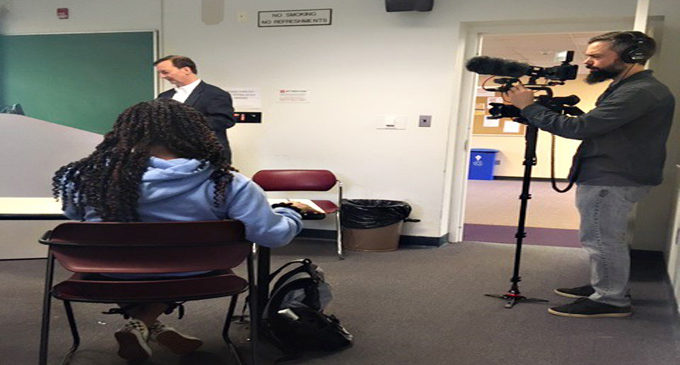Against backdrop of ‘rigged’ education systems, WSSU stands out
On the set of the documentary ‘RIGGED.

Documentary “RIGGED” highlights work of CSEM in community
By John Railey
In recent years, stories of wealthy parents bribing their children into top colleges have grabbed the headlines. That, however, is only one part of a system of higher education that often favors the rich, a new documentary, “RIGGED,” spells out. The documentary spotlights Winston-Salem State University as one of just three colleges nationwide whose innovative efforts are reversing education inequities.
Specifically, RIGGED (which can be viewed at RIGGED Documentary – Let’s Get Real about the American Dream), features WSSU’s Center for the Study of Economic Mobility (CSEM) as a program chipping away at what the filmmakers see as a big problem. “The recent U.S. college admissions scandal is not merely an aberration in an otherwise virtuous system,” the filmmakers say on their website. “It lays bare a U.S. higher education system in which wealth and influence remain the predominant values. RIGGED examines how this obsolete value system favoring wealth in higher education grows the disparity between rich and poor and thereby undermines the future of American Democracy.”
WSSU bucks that tide. It nurtures its students to give back to their communities, including through efforts to raise economic mobility. CSEM is the bedrock of that push. In the film, CSEM Director Craig Richardson likens that effort to a ladder with broken rungs, making it hard, if not impossible, for many to rise in economic mobility. As Richardson has said, the American dream may be holding for people in the middle class and upper middle class, but not for those at the bottom of the ladder, and the reasons for that are complex.
CSEM, through its research and community engagement, seeks to define those reasons and repair those rungs. That aligns with one of the themes of the film, that of higher education being undervalued as a “tool of social change,” as the film’s narrator, Jim Wolfston says. Wolfston, also the film’s executive producer, is the founder and president of CollegeNET, which supports greater affordability and access to higher education. Filmmakers Tracy MacDonald and Matt Zodrow worked on the film with Writer/Production Manager Jill Thacker.
Zagros Madjd-Sadjadi, CSEM’s senior research fellow for regional economics, says in the film that, in this country, the educational system has concentrated on educating “people of means.” WSSU, with many of its students the first in their families to attend college, sets a better model. WSSU Chancellor Elwood Robinson notes that HBCUs are increasingly important because of “the tremendous divide” in providing education to all. He, Richardson and CSEM Associate Director Alvin Atkinson, place the challenge of doing that against Winston-Salem history. As the city’s industrial power base fizzled, Atkinson said, “you had the have and have-nots … I think the [local] government has tried to come to grips with that, but they’re [sometimes] operating from this incorrect knowledge.”
CSEM fills the void through objective research that provides solid data, including by immersing themselves, along with student interns, in the communities around the campus. “I think what’s critical to me is actually going into the community and talking to the people who are impacted,” Research Fellow Charity Griffin, an assistant professor in the Department of Psychological Sciences who studies local public education, says in the film. “Not just talking about them, but also, to me, most critical is to actually go into the community and talk to the people who are impacted … talking to them and listening to them about, most importantly, about what they perceive their struggles are in terms of access … How can I help them get those answers, given the resources that I may have access to, that they may not have access to?”
Richardson indicates in the film that, for too long, there’s been no meeting of “the town and the gown.” That’s unfortunate, he says, because of all the experiences missed. WSSU and CSEM are changing that by reaching beyond the campus walls.
John Railey, raileyjb@gmail.com, is the writer-in-residence for CSEM, www.wssu.edu/csem.









